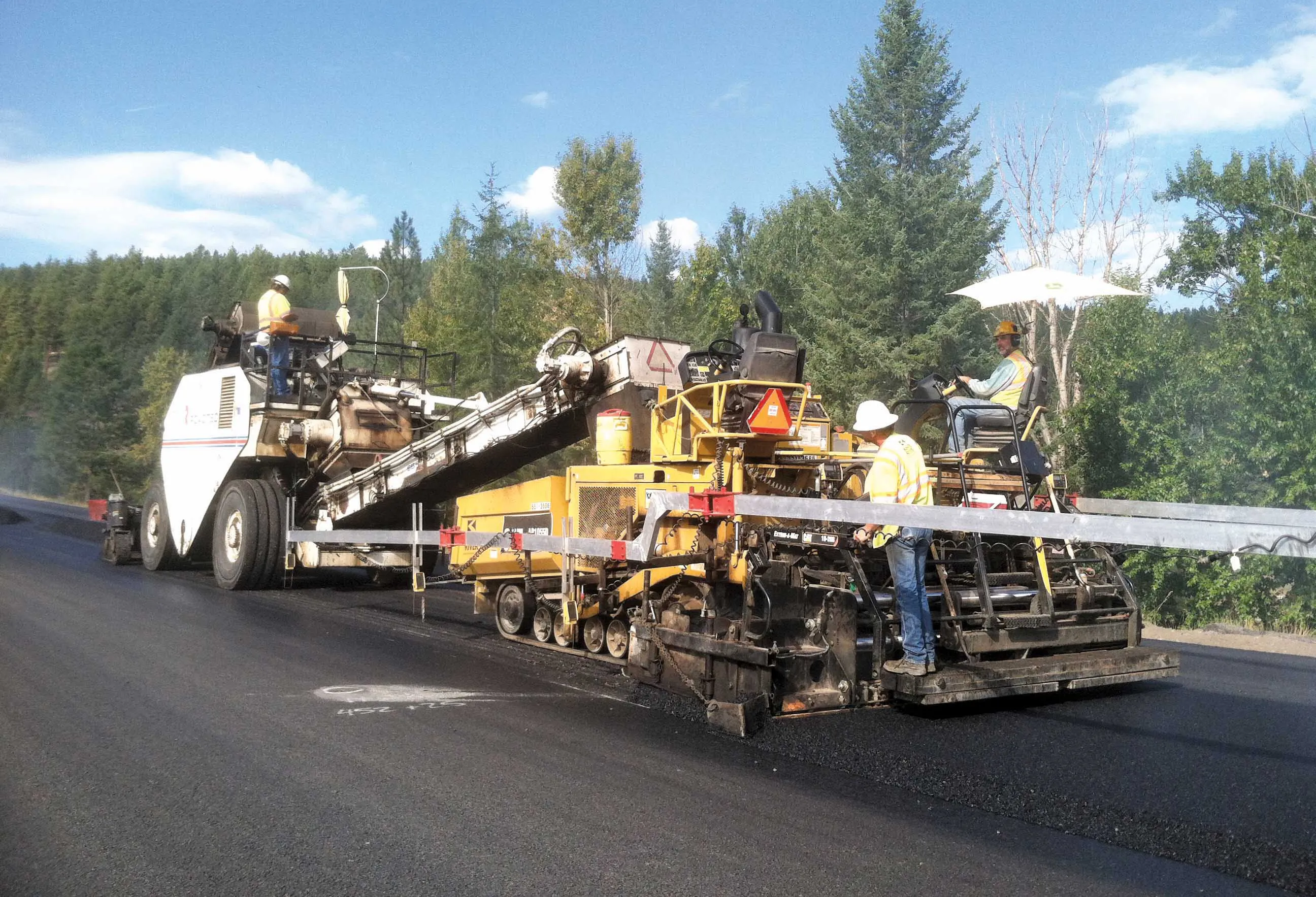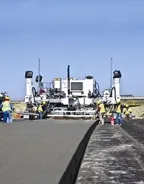Achieving a smooth road surface has helped a US contractor gain a bonus payment of US$605,000 on a paving job in Montana. A recently renovated 16km section of I-90, starting in Alberton, Mont., which is located on the Western part of the state near the Idaho border, and stretching East, received sterling commendations, beat target IRI scores, and earned the general contractor quality bonuses. The project also won the 2014 MCA Excellence Award for Best Paving Smoothness from the Montana Contractors Associat
September 28, 2015
Read time: 4 mins

Achieving a smooth road surface has helped a US contractor gain a bonus payment of US$605,000 on a paving job in Montana
A recently renovated 16km section of I-90, starting in Alberton, Montana, which is located on the Western part of the state near the Idaho border, and stretching East, received sterling commendations, beat target IRI scores, and earned the general contractor quality bonuses. The project also won the 2014 MCA Excellence Award for Best Paving Smoothness from the Montana Contractors Association.
Knife River Corporation was the general contractor on the $15.5 million I-90 renovation. The I-90 project commenced on June 10th with Knife River’s subcontractor, Industrial Builders, performing the shoulder-to-shoulder milling of the road to 90mm, with the milled material converted to Reclaimed Asphalt Pavement (RAP). The drive lane and passing lane were milled out an additional 90mm for a total of 180mm.
As Industrial Builders began completing the 64km of milling, Knife River could begin paving. The bonus incentives offered by MDT were based on achieving paved finished surfaces with favourable International Roughness Index (IRI) scores. The 45 – 55 IRI rating was considered acceptable, with no bonus and no penalty. Achieving the 35 – 44 IRI rating would have earned up to a 24% bonus, based on a sliding scale. Meanwhile a rating below 35 IRI would have earned a 25% bonus.
The contractor knew that to achieve a low IRI index throughout the job, continuous paving was needed with thoroughly mixed HMA at the right temperature. A key factor for this was the use of a material transfer vehicle to feed the paver.
Knife River owns three1252 Roadtec SB-2500e/ex Shuttle Buggy MTVs and knew that employing one of the units would be crucial for maximising the performance of the asphalt paver. Using the unit would also cut haulage costs by allowing trucks to dump their loads quickly and then return to the asphalt plant, 37-45km away. The MTV’s 23.5tonne surge capacity provided the contractor with plenty of mix to feed the paver and keep it continuously productive, as well as reducing thermal and material segregation.
Knife River used a two-dump-truck train for asphalt hauling. The lead belly dump had a 23.5- to 25.3tonne capacity and the connected pup had a 10.8-12.6tonne capacity. The Shuttle Buggy used a windrow pickup head to add the hauled HMA to its dump hopper.
The Montana I-90 rehab project required a total of 148,830tonnes of HMA with around one third of that being recycled asphalt pavement (RAP). Knife River placed three lifts. The bottom lift was 91.4mm thick and the top two layers were each 45.7mm thick.
The project required cooperation and coordination to maintain uninterrupted paving. In addition to the steady delivery of HMA from the asphalt plant, there was the removal and replacement of 18,288m of guardrails. Subcontractor Mountain West Holding Company used six punch trucks to pull guard rails in front of the paver and then replace them afterwards, and this work was also carried out efficiently.
The Montana I-90 project was completed a full year ahead of schedule. In addition to an early completion, Knife River Corporation also achieved an average IRI index score of 29, which gave the company the highest incentive payment for finished pavement smoothness, earning the firm its $605,000 in bonuses.
The MTV played a key role as the quick turnaround of the haul trucks helped maintain the high production pace that Knife River set. Early in the day, Knife River would pave at a rate of 406tonnes/hour and slow the pace down to 315.7tonnes/hour toward the end of the day because it was outstripping the asphalt plant’s production.
A recently renovated 16km section of I-90, starting in Alberton, Montana, which is located on the Western part of the state near the Idaho border, and stretching East, received sterling commendations, beat target IRI scores, and earned the general contractor quality bonuses. The project also won the 2014 MCA Excellence Award for Best Paving Smoothness from the Montana Contractors Association.
Knife River Corporation was the general contractor on the $15.5 million I-90 renovation. The I-90 project commenced on June 10th with Knife River’s subcontractor, Industrial Builders, performing the shoulder-to-shoulder milling of the road to 90mm, with the milled material converted to Reclaimed Asphalt Pavement (RAP). The drive lane and passing lane were milled out an additional 90mm for a total of 180mm.
As Industrial Builders began completing the 64km of milling, Knife River could begin paving. The bonus incentives offered by MDT were based on achieving paved finished surfaces with favourable International Roughness Index (IRI) scores. The 45 – 55 IRI rating was considered acceptable, with no bonus and no penalty. Achieving the 35 – 44 IRI rating would have earned up to a 24% bonus, based on a sliding scale. Meanwhile a rating below 35 IRI would have earned a 25% bonus.
The contractor knew that to achieve a low IRI index throughout the job, continuous paving was needed with thoroughly mixed HMA at the right temperature. A key factor for this was the use of a material transfer vehicle to feed the paver.
Knife River owns three
Knife River used a two-dump-truck train for asphalt hauling. The lead belly dump had a 23.5- to 25.3tonne capacity and the connected pup had a 10.8-12.6tonne capacity. The Shuttle Buggy used a windrow pickup head to add the hauled HMA to its dump hopper.
The Montana I-90 rehab project required a total of 148,830tonnes of HMA with around one third of that being recycled asphalt pavement (RAP). Knife River placed three lifts. The bottom lift was 91.4mm thick and the top two layers were each 45.7mm thick.
The project required cooperation and coordination to maintain uninterrupted paving. In addition to the steady delivery of HMA from the asphalt plant, there was the removal and replacement of 18,288m of guardrails. Subcontractor Mountain West Holding Company used six punch trucks to pull guard rails in front of the paver and then replace them afterwards, and this work was also carried out efficiently.
The Montana I-90 project was completed a full year ahead of schedule. In addition to an early completion, Knife River Corporation also achieved an average IRI index score of 29, which gave the company the highest incentive payment for finished pavement smoothness, earning the firm its $605,000 in bonuses.
The MTV played a key role as the quick turnaround of the haul trucks helped maintain the high production pace that Knife River set. Early in the day, Knife River would pave at a rate of 406tonnes/hour and slow the pace down to 315.7tonnes/hour toward the end of the day because it was outstripping the asphalt plant’s production.








